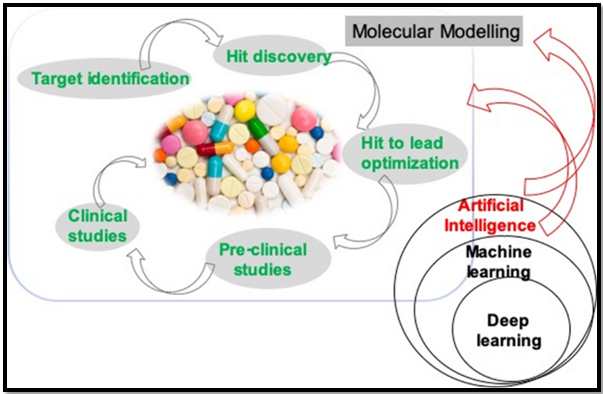“REVOLUTIONIZING DRUG DEVELOPMENT WITH ARTIFICIAL INTELLIGENCE”
Syllabus:
- GS-3 : Science and technology related to health and use of artificial intelligence
- GS-4 :Laws, rules, regulations, and conscience as sources of ethical guidance.
Focus :
- This article delves into the transformative impact of Artificial Intelligence (AI) on drug development, specifically focusing on target protein identification and drug-target interaction prediction.
- It explores the advancements made by AI tools like AlphaFold and RoseTTAFold, while assessing India’s position in leveraging AI for computational drug development amidst infrastructure challenges and opportunities for growth.
Source - TH
Introduction:
- Drug development, traditionally expensive and time-consuming, has seen advancements with the integration of Artificial Intelligence (AI).
- AI tools such as AlphaFold and RoseTTAFold have transformed target identification and drug-target interaction prediction.
- India’s potential in computational drug development is examined in light of technological advancements and infrastructure challenges.
Understanding Target Proteins:
Identification and Validation:
Target proteins, usually genes or proteins, serve as binding sites for drugs to exert their therapeutic effects.
Identification of druggable proteins involves computational analysis of protein sequences to determine ideal binding sites.
Role of Computational Models:
Computer algorithms analyze protein structures and drug libraries to identify potential interactions.
Models utilize known structures and predictive algorithms to simulate drug-protein interactions, streamlining the discovery process.
Contribution of AI in Drug Development:
Role in Target Discovery:
AI accelerates target discovery by analyzing vast datasets to identify potential drug targets.
Deep learning algorithms enhance accuracy and efficiency in predicting drug-protein interactions.
Advantages of AI Tools:
AlphaFold and RoseTTAFold leverage deep neural networks to predict protein structures with high accuracy.
Predictive capabilities aid in understanding complex protein interactions, facilitating drug development.
AlphaFold and RoseTTAFold:
Technological Breakthrough:
AlphaFold and RoseTTAFold represent significant advancements in computational drug development.
Predictive models accurately determine protein structures and interactions, enhancing drug discovery processes.
Enhanced Capabilities:
Upgraded versions of AlphaFold and RoseTTAFold predict dynamic structures and interactions for various biomolecules.
Generative diffusion-based architectures improve prediction accuracy, enabling precise modeling of protein complexes.
Challenges and Limitations:
Accuracy Concerns:
AI tools provide up to 80% accuracy in predicting interactions, with limitations in predicting protein-RNA interactions.
Model hallucinations and insufficient training data pose challenges in accurate predictions.
Scope of Application:
AI tools primarily aid in target discovery and drug-target interaction prediction, but do not replace pre-clinical and clinical development phases.
Limited scope of application necessitates further validation and testing in subsequent drug development stages.
WHO guidelines for use of AI and LLM(Large Language Models ) in healthcare :
|
India’s Position in Computational Drug Development:
Infrastructure Challenges:
India lacks large-scale computing infrastructure required for AI-driven drug development.
Limited availability of fast GPUs and skilled AI scientists hinder progress in developing AI tools.
Opportunities for Growth:
Despite challenges, India’s burgeoning pharmaceutical sector presents opportunities for applying AI in drug development.
Leveraging expertise in structural biology and increasing investment in computational infrastructure can propel India’s role in drug discovery.
Source:The Hindu
Associated article :
https://universalinstitutions.com/ai-and-the-issue-of-human-centricity-in-copyright-law/
Mains Practice Question :
GS-3
“Examine the role of Artificial Intelligence in revolutionizing drug development processes, with a focus on target identification and drug-target interaction prediction. Discuss the significance of AI tools such as AlphaFold and RoseTTAFold and evaluate India’s potential in leveraging AI for computational drug development, considering challenges and opportunities.” (250 words)




